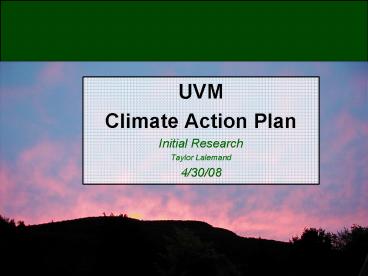UVM - PowerPoint PPT Presentation
1 / 19
Title:
UVM
Description:
Requirements for the American College & University Presidents' Climate ... campus plant could provide heat, chilled water, possibly power, possibly with biomass ... – PowerPoint PPT presentation
Number of Views:1006
Avg rating:3.0/5.0
Title: UVM
1
- UVM
- Climate Action Plan
- Initial Research
- Taylor Lalemand
- 4/30/08
2
Outline
- Requirements for the American College
University Presidents Climate Commitment, ACUPCC
- Buildings Efficiency at UVM Strengths,
Weaknesses, Opportunities and Threats(interviews
with Physical Plant staff) - Climate Action Plans from other institutions
(research) - Stakeholder Willingness-To-Pay (WTP) for
reduction in campus emissions, /person
(Contingent Valuation Study estimating a demand)
3
I. Requirements for the ACUPCC Climate Action
Plan
- i. Introduction Why How
- ii. Campus Emissions
- a) Target Date and Interim Targets
- iii. Mitigation Strategies
- iv. Educational, Research and Outreach Efforts
- a) Curriculum and Other Educational Experiences
- b) Research
- c) Community Outreach and Other Efforts
- v. Financing
- vi. Tracking Progress a) Tracking Progress
- b) Modifying the Plan
4
ACUPCC Plan Sections
- Mitigation Strategies
- Buildings energy use
- Buildings energy sources
- Transportation energy use
- (Air travel)
- Offsets
- Buildings energy use
- New and existing buildings
- Infrastructure and controls
- Conservation and efficiency
5
Buildings Energy Efficiency Themes Derived
from Interviews
- Strengths
- Weaknesses
- Threats
- Opportunities and Ideas
6
I. Strengths
- New Existing Buildings
- UVM has made wise use of space so far
- LEED silver is a huge success
- Staff are educated, communicate among
departments some go above and beyond - Infrastructure Controls
- Monitoring capability
- Conservation Efficiency
- Burlington has good incentives for energy
efficiency Eco-rep program has been successfully
established - Engaged students in the Davis center construction
7
II. Weaknesses
- New and existing buildings
- LEED EB is very difficult to attain
- Historic preservation constraints (in VT gt 50yrs)
- Focusing on efficiency diverts attention from
energy sources - Infrastructure and controls
- Local utilities constrain choices for campus
energy projects - Conservation and efficiency
- Controls management needs evaluation limited
staff capacity for control systems - Management limited staff capacity for
collaborative projects, market participation and
realistic forecasting
8
III. Threats
- Budget crisis shifts focus from the long term to
the short term - Turnover in administration delays major
negotiations - Deferred maintenance gt250 million, 40 of
buildings are awaiting repair
9
IV. Opportunities Ideas
- New Existing Buildings
- Infrastructure Controls
- Conservation Efficiency
10
1. New Existing Buildings
- Decide how sustainable we want our buildings to
be in five and ten years - Work toward LEED EB over time, starting with
metering and custodial practices - Beware of value engineering dont build until
fully funded to do it right - Sell or get rid of wood-frame buildings
- Have staff in Facilities Design services rotate
with those in Physical Plant to promote
high-level integration of functions
11
2. Infrastructure Controls
- As campus grows in short term, the next step is
looped systems for heating and cooling that
provide redundancy and consistency - Examine management of control system for
campus-wide optimization and accountability to
include functions of an optimizing engineer and
utilities manager. - Consider heating plant on south campus, and
upgrade Trinity - South campus plant could provide heat, chilled
water, possibly power, possibly with biomass
12
3. Conservation Efficiency
- Plan for conservation efficiency
- Standardize class times to maximize building
efficiency - Inform custodial staff and police about lights
and windows and resulting savings - Turn off heat two weeks earlier than usualmust
monitor buildings and educate occupants - Meter and charge departments for their energy use
13
III. Climate Neutrality Plans
20022004 Separate fund for emission reduction
projects 20022006 Strengthen CFC management
program- replace R-12 and R-22 with HFC-134a
20022017 Upgrade for energy-efficiency of
buildings involved in any construction
projects 20102012 remove coal-fired CHP-
replace with high-efficiency gas powered
unit 20122016 co-generation system new
generation system(fuel cell or combustion
turbine) on campus 2013 Purchase carbon offset
portfolio 20132018 Sell surplus carbon offsets
due to reduced emissions 2019, or earlier Net
zero emissions. 2020 Provide measured,
monitored, verified, and approved climate
neutrality.
14
III. Climate Neutrality Plans
- Unique Strengths Weaknesses
- (-) Generated New Inventory Protocol
(/-) Student Run Inventory- Evolved Staff/Studen
t plan
Yales Greenhouse Gas Reduction Strategy 20052020
15
III. Climate Neutrality Plans
- 1. Increasing Efficiency
- 2. Fuel Switching
- 3. Decreasing Energy Demand
- 4. Purchasing Carbon Credits
Strengths Weaknesses (/-) Grant funded (/-)
CCX Member
16
IV. UVM Stakeholders WTP for Campus Climate
Neutrality
- Topic Contingent Valuation Study of UVM Energy
Policy (Climate Neutrality Plan) - Research Questions
- Willingness to Pay (WTP) What is the value
associated with a Climate Neutral campus for UVM
stakeholders (students, faculty staff)? - Information Bias Do people assign a higher value
to being the leader of institutional commitments,
nationally, to Climate Neutrality?
17
WTP Results
- Regression Equation
- WTP79.21605848 Intercept -43.98535098
Leadership/Bias 121.6705721 - Employee Status 4.687774487 Actual
Environmentalism -101.7396005 - Comment
Mean WTP 63.11/person/month Median WTP
21.00/person/month Payment vehicle
Employeepay cut Studenta tuition increase
18
Next Steps Follow-up Work
- Rank the findings of qualitative surveys and
distill into optimal themes - Match themes with successful mitigation
strategies seen at other institutions - Identify areas for potential improvement in my
CVM- generate a revised question accounting
feedback for another potential study next year
19
Next Steps for Climate Action Plan
- ENVS 295 course results
- Presidents Commission on Sustainability forms in
fall - Draft for review 5/09
- Plan due 9/09
- Taylor does cost-benefit analysis of options































